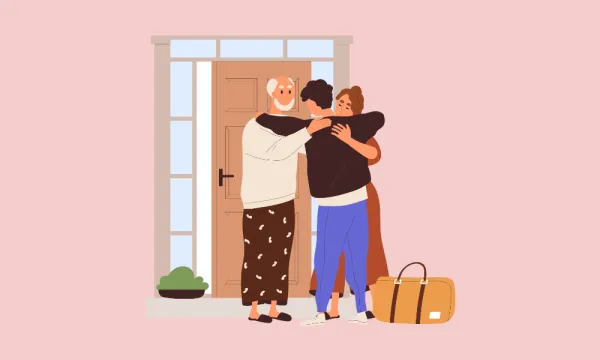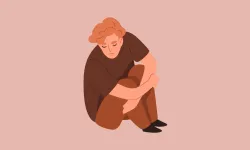Divorce cases are hard all around. You may see positive signs during separation, then watch the case become heated as you begin to divide assets. You may also have fights over things like the home you owned together or alimony payments, and all of this can impact your future and may force you to move back in with your parents.
So how can you cope with this situation?
Things to know
- Make sure you talk with your parents before moving in so you can establish rules and boundaries.
- Find ways to maintain your independence even while you live at home.
- Draft a timeline for moving out, so you don't feel stuck with your parents permanently.
No one wants to "lose" in divorce cases. Even with the best divorce lawyer and a strong argument for everything, there are situations where one or both divorcing spouses must move back in with their parents in the aftermath of their separation.
Although the emotional support parents can provide is nice, many people dread the idea of moving back in with their parents after divorce.
The good news is that moving into your childhood home post-divorce doesn't have to be as bad as it sounds. You just need to know how to make the transition an easy experience for everyone. Here's what you need to know:
- Talk With Your Parents Before Divorce Proceedings Are Finalized
- Downsize Before You Relocate
- Maintain Your Independence
- Remember, This Isn't Permanent
Talk With Your Parents Before Divorce Proceedings Are Finalized
Moving back in with your parents after divorce isn't nearly the same as living with your parents during childhood or even your college years. Chances are you haven't lived in your parents' home in quite some time, so this will be a new situation for both you and your parents.

You never want to assume anything about this living arrangement, even if it's a planned move and your parents seem open to the idea. Therefore, you should schedule a time to sit down with your parents and work through all of the logistics before you move back into the family home.
Rent and household expenses
If you have been living independently for quite some time, then you are used to paying your own household expenses. However, you never had to pay rent or help with bills as a child. Many adult children assume that moving back into their childhood home provides the same perks as it did when they were kids... but that's not always how it works.
Financial debates are of the most common disputes parents, and adult children have when a child moves back home. These arguments can become heated, and sometimes parents become so agitated that they force their child to move back out. If you're also going through a divorce, that's probably the last thing you want to happen.
You can avoid a lot of this if you have the conversation upfront. Before you move in, ask your parents what their expectations are for you in regard to rent, utilities, and other household expenses. Also, ask them about grocery shopping and other soft expenses they may want to split.
By asking about these financial matters before you move in, the transition can occur much more smoothly.
House rules
Financial support is not the only issue adult children run into when moving back in with parents after divorce. They also have problems with parents who see this as an opportunity to relive the glory days of your adolescent years, meaning they may try to enforce rules about who you go out with or how late you can stay out at night.
Therefore, you will also want to outline house rules and expectations with your parents before you move back in. You can remind your parents that you are an adult and can therefore make your own decisions. You can also justify some of your requests by sharing how you'll contribute to the household, so they see you not as a child but as an adult.
Since it is your parents' house, though, they ultimately have the final say in anything related to what goes on within the home. Just be sure to discuss everything in detail, so there's no room for ambiguity or questioning.
Child custody

If you are a parent who is moving back in with your parents, this can add another complicated dynamic structure that you need to work through before you move into the house. If you are the primary custodial parent or share joint physical custody of your children with your former spouse, then your children will be living with you in your parents' home.
Ask your parents how involved (or not involved) they want to be with the day-to-day care of your children. Also, ask them what their rules will be for babysitting, transporting kids, and other needs that may arise. By having this all established before you move in, the transition will feel much easier and be filled with lots less stress.
Downsize Before You Relocate
Moving back in with your parents after divorce involves a lot of logistics. You probably received at least some of the furniture or household items as part of your divorce proceedings. However, not all of those things will possibly fit in your childhood bedroom, and your parents' house is likely already furnished.
Before you move in, you will want to downsize a bit. You can start by asking your parents to remove everything in the bedroom that will become yours. Then, think about what furniture, clothing, and household items you will have room for.
If there are items you know you will not be able to fit in your new space, consider selling them to pay off student loan debt or other types of debt you'd like to get rid of. If you want to keep some items, consider renting a storage unit for them.
Minimizing what you move to your parents' house will help make the moving process less work and less stressful.
Maintain Your Independence

When you lose your residential independence in situations like a divorce case, it can make it that much harder to maintain other aspects of your individuality and independent ways as an adult. However, there are things you can do to maintain this independence even when you move back into your parental home.
One of the easiest ways to do this is by maintaining your own health insurance and individual bills as possible. However, you will need to also do things to maintain some semblance of your identity within the home.
Dividing your time
As you start living with your parents again, you may notice that you become heavily involved with them. If you are eating dinner with them every night, watching television with them, and spending all your free time talking to them, you may feel like you no longer have an individual identity anymore. This can be hard.
So, you will need to look for ways to divide your time between your parents and your own individual desires. Try to maintain your regular social life and spend time with friends or coworkers regularly. This can be once a week or even just a couple of times each month. It should simply mirror what you were doing before the divorce as part of your routine.
Also, make sure you maintain any hobbies you had before. Hobbies can be a great way to take time for yourself or get out and connect with others. So keep doing anything you were before the divorce, and find a new hobby if you need something else.

Of course, divorce can be hard on everyone, so be sure you do what you need for your mental health. This may mean you need to tell your parents when you need an evening to yourself, or you may have to explain to them how they can best support you.
Although you are still your own person, you will want to carve out some time to spend with your parents since you are living with them. This can be something you do once per week or something you do at an interval that makes the most sense based on your schedule and your parents'.
You may also need to set aside time for household chores. Even though it is your parents' home, you are still one of the residents there. This means you should also be helping with some of the chores.
Ask your parents what their preferences are, then take on the chores they ask you to do. You may also want to ask about cooking dinner for your parents once or twice per week, so it feels like you are contributing as well.
Remember, This Isn't Permanent
Moving back in with parents after divorce can be a difficult transition. It may make you think, "I divorced my husband, now I miss him," or at least may make you miss your independence. However, moving back into your childhood home doesn't have to be a death sentence to independent living.
This will simply be a temporary situation to help you stabilize after the divorce and get back on your feet. You can (and should) set parameters on how long you're going to live at home before finding a place of your own. This goal will help you see the light at the end of the tunnel, even on those difficult days of living with your parents.
Nothing is permanent in life, even after a divorce. Your time living with your parents won't last forever, and you can establish rules and boundaries to make the time you do spend living with them bearable for everyone.









